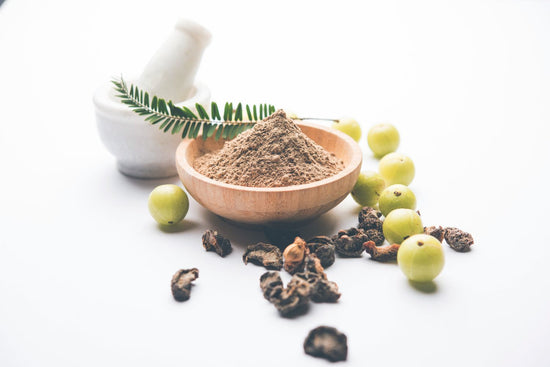Many times hormonal imbalances are brushed off as mood swings or PMS. But you may have seen ads on social media or television listing various symptoms associated with hormonal imbalance and urging you to check your hormones. Is hormonal imbalance something natural that happens every month and is nothing to worry about? Or should you be concerned about your fluctuating hormone levels?
Sometimes, hormonal imbalance can be more concerning than just a bad mood. It has the ability to affect your cognitive function and physical health too. Taking care of your hormones can help you have the energy, mood, and mental clarity needed to go about your day, whether it's chasing kids or deadlines at work!
What is a Hormone Imbalance?
Hormones are responsible for many bodily functions. They assist with the metabolism of food, growth, sexual function, reproductive health, sleep cycles, cognitive function, and mood. Hormones also help to regulate your temperature and let you know when you're thirsty. They're your body's way of communicating, chemical messengers, if you will.
Your endocrine glands secrete these hormones into your bloodstream so that they can react with receptors. Major endocrine glands found in your body include the thymus, thyroid, pineal gland, pituitary gland, and adrenal glands. Researchers have identified around fifty hormones that make up your endocrine system, a carefully regulated symptom essential for health and wellness.
Your body only needs a tiny amount of hormones to make significant changes. Slightly too much or too little secretion can have big effects. This is known as a hormone imbalance when your hormone levels fluctuate or are at incorrect levels. Hormonal imbalance can describe a variety of hormone-based issues as it is relatively broad. Each type of hormone imbalance can create slightly different symptoms and outcomes.
Hormone Imbalances Types
Hormone imbalances can be acute (short-term) or chronic (long-term). Some of them may need to be treated by a medical professional. In contrast, others can be cared for with natural remedies.
Typical forms of hormone imbalances include:
Irregular periods
Irregular menstrual cycles can look like too few periods or too frequent periods. Your period may also vary in length and flow. There are around eight hormones involved in the menstrual cycle, and any one of them can be imbalanced. In addition, certain health conditions like PCOS are hormone related and known to cause irregular periods.
Infertility
Like the menstrual cycle, several hormones are associated with ovulation, conception, and pregnancy. Hormonal imbalances are the leading cause of infertility among women. However, men can also experience hormonal imbalances, like low testosterone, that affect fertility. Many hormone-related conditions, such as amenorrhea and PCOS, can play a role in hormone health and a woman's ability to get pregnant.
Weight Gain
Hormones play a role in food metabolism and hunger. They can signal to your body when you need food and affect what your body does with that food. A hormonal imbalance can cause your body to store fat, leading to weight gain. In some cases, this can lead to obesity. Specific medical conditions, like hypothyroidism, can contribute to hormone imbalances that cause weight gain.
Acne
Adult acne that happens outside of puberty is commonly known as hormonal acne. Clogged pores often aren't only caused by hormones, but hormonal fluctuations can undoubtedly play a role. They can cause your skin to produce excess oil, leading to more breakouts. Pregnant, newly postpartum women or those going through menopause commonly experience hormonal acne.
Thyroid Disease
Many individuals with thyroid disease either experience hyperthyroidism (too much thyroid hormone) or hypothyroidism (too little thyroid hormone). Each condition has different causes and both present with various symptoms. Most thyroid diseases require medical treatment.
Other hormonal imbalances can affect health. Poor sleep can be both caused and furthered by a hormonal imbalance. Mood disorders are another possible indicator of a hormonal imbalance.
Signs and Symptoms of a Hormonal Imbalance
Depending on what hormones are irregular or fluctuating, you can experience a host of symptoms. Keep in mind, though, your symptoms may not always be related to your hormones. Some may be the result of another underlying medical condition.
Symptoms of a metabolism imbalance:
-
Unexplained weight loss or gain
-
Fatigue
-
Constipation or diarrhea
-
High cholesterol
-
Depression
-
Temperature sensitivity
-
Irregular body fat distribution
-
Frequent, extreme thirst
Symptoms of a reproductive hormone imbalance:
-
Heavy periods
-
Irregular menstrual cycles
-
Acne
-
Hair loss
-
Hot flashes
-
Infertility
-
Low libido
-
Vaginal dryness
Remember, with over fifty hormones in the body, other imbalances can trigger different symptoms. These are only two of the most common types of imbalances and their symptoms.
What Causes Hormone Imbalances?
Hormone imbalances can be triggered by significant life events, like pregnancy, or smaller, ongoing issues, such as lack of sleep. Your hormone levels naturally fluctuate throughout your life but also throughout each day.
For women, life events that can trigger hormonal imbalance include:
-
Pregnancy
-
Menopause
-
Puberty
If your hormones seem imbalanced outside of significant events like these, there are various things that could be triggering it. Such as:
-
Poor sleep
-
Stress
-
Certain medications
-
Steroids
-
Injury or damage to an endocrine gland
-
Autoimmune disease
-
Growth or tumor affecting a gland
Because the cause of hormonal imbalance can be so varied, it is important to check with your doctor. They may be able to determine which hormones are imbalanced and help identify a possible cause. After you know the reason for your hormone fluctuations, you can begin working towards restoring balance to your body.

Hormone Balance Herbs, Nutrients, and Nutritional Options
For many types of hormone imbalances, there are tools you can try outside of traditional medications. Things like diet, supplements, and lifestyle can all have a positive effect on hormones and hormonal regulation.
Supplemental and Alternative Medicine
Herbs can have a surprisingly powerful effect on your hormones. Many of these herbs have been used for centuries in Ayurveda to reduce hormonal imbalance symptoms while working to restore harmony to the body.
Ashwagandha: Ashwagandha is a highly researched adaptogen. It is sometimes called Indian Ginseng or Withania somnifera. As an adaptogen, it excels in helping your body manage stress. The stress hormone cortisol is released by your body's hypothalamic-pituitary-adrenal (HPA) axis. This center helps trigger your body's stress response, like flight or fight. Ashwagandha helps to regulate the HPA axis for decreased stress, better sleep, and lower cortisol levels.
Shatavari: Shatavari has long been used in Ayurveda, where it is known as "100 spouses" to treat infertility. Today we know that this potent herb assists with producing the hormones progesterone, estrogen, follicular-stimulating hormone (FSH), and luteinizing hormone (LH). It is helpful in balancing hormones in women with PCOS or who are struggling with fertility. Shatavari is also an excellent uterine tonic that helps to promote healthy, regular menstrual cycles.
Holy Basil: Holy Basil is native to India and has been used in Ayurveda for centuries. It has a profound effect on the body's cortisol levels, helping to regulate them. In turn, it offers lower stress, improved mental clarity, and better focus, essentially soothing the nervous system. It is also helpful in regulating other hormones that play a role in sleep, blood pressure, and blood sugar levels.
Rhodiola: Rhodiola is an herb that contains a phytochemical called Salidroside. Salidroside helps to manage your body's cortisol levels. Not only does this reduce anxiety, but it can also fight the effects of aging. Rhodiola is great for fighting burnout caused by work, family, or other activities.
Motherwort: Motherwort produces estrogen-like actions in your body. It contains a substance called leonurine that offers benefits for women. Leonine produces mild uterine contractions, which can help ease postpartum after-birth pains. As an emmenagogue, it also stimulates blood flow to the uterus, promoting regular menstrual cycles if your period is delayed. Finally, Motherwort is known to soothe the nerves, lowering stress and anxiety while having a calming effect.
Eleuthero: Also known as Siberian Ginseng, Eleuthero is an adaptogen. As such, it helps the body fight the effects of stress. It can help improve mental clarity, promote calmness, increase energy, and boost stamina. Certain substances within it bind to estrogen receptor sites. In women going through menopause, estrogen can cause uncomfortable symptoms. When eleuthero binds to the receptor sites, it may help reduce withdrawal effects.
These herbs can work together to regulate many different hormones that can affect women of post-childbearing age. Freshly mom Hormonal Balance and Mood Support contains all of the herbs mentioned above and a few other plant-based hormone rockstars that promote wellness from the outside in.
Ayurvedic Hormonal Balance and Mood Support
Formulated by Ayurvedic experts and made with organic, ethically-sourced herbs to support hormonal balance and mental well-being.
Nutrition
Certain foods, as well as a well-rounded approach to your diet, can have positive effects on your hormones. Protein is one way in which you can help your body regulate its hormones.
You should try to get protein, in some form, at every meal. Your body cannot produce certain amino acids, and protein can help you meet these needs. These amino acids are essential because your body needs them to produce peptide hormones derived from protein. These protein-derived hormones are essential for stress regulation, appetite, and energy.
Cruciferous vegetables, like broccoli and brussels sprouts, are also fantastic for hormone regulation. They contain a phytochemical called Indole-3-Carbinol. This phytochemical helps your liver flush out "spent" or old hormones. Other nutrients from foods that are helpful in hormone balance include:
-
Lignans, a phytoestrogen that helps to promote the production of estrogen while clearing out spent hormones. Often found in flaxseeds.
-
Fiber, such as from quinoa or brown rice that, also includes B vitamins for flushing out old hormones.
-
Natural sugar from whole fruits (in moderation) can assist in regulating blood sugar levels.
-
Magnesium is essential in allowing your body to better assess blood sugar levels and use insulin. Found in avocados, dark leafy greens, legumes, and nuts.
As you can see, eating a well-rounded diet that includes protein, slow-release carbohydrates, and fresh produce is ideal for helping your body produce and eliminate hormones.
BHRT (Bioidentical Hormone Replacement Therapy)
In some cases, natural remedies aren't enough to support hormone regulation. For example, in the case of a thyroidectomy, the thyroid gland is removed from the body. Without this gland, the body can no longer produce enough thyroid hormones for metabolism and other vital functions.
In situations like these, your doctor may advise man-made hormones. A regime of synthetic hormones is known as BHRT (Bioidentical Hormone Replacement Therapy). Suppose your body is unable to produce enough hormone or can't make the hormone at all. In that case, your doctor will likely want to start with Bioidentical because they are the closest to the hormones your body naturally produces. They can come in the form of pills, injections, creams, and gels.
Other synthetic hormones are available but aren't as readily absorbed. You can also find natural hormones sourced from ingredients such as yams. However, these, too, must go through rigorous FDA approval and are often processed in some way.
Hormone therapy can help relieve symptoms of your hormonal imbalance. However, there is often an adjustment period as your body gets used to the hormones. Additionally, depending on why you are taking hormones, it could mean taking medication every day for the foreseeable future. Unless prescribed by your doctor, Bioidentical hormones are not an option for most people.
What Are Your Options?
Suppose you are dealing with hormonal imbalance that is not a symptom of a medical condition requiring treatment. In that case, you may be interested in female hormone balance supplements. Herbal hormonal support can be a surprisingly effective way to promote hormone regulation which may help with hormonal acne, weight gain, sleep, stamina, energy, and mental clarity. It can also be a wonderful mood enhancer.
Freshly mom Hormonal Balance and Mood Support is a well-rounded hormonal support supplement. Unlike other female hormone balance supplements, it isn't focused solely on fertility or other singular aspects of a woman's well-being. Our women's hormone balance support is ideal for women who want to regulate their menstrual cycle, improve their mood, and reduce burnout. A carefully crafted blend helps to soothe, balance, and support every aspect of you!





